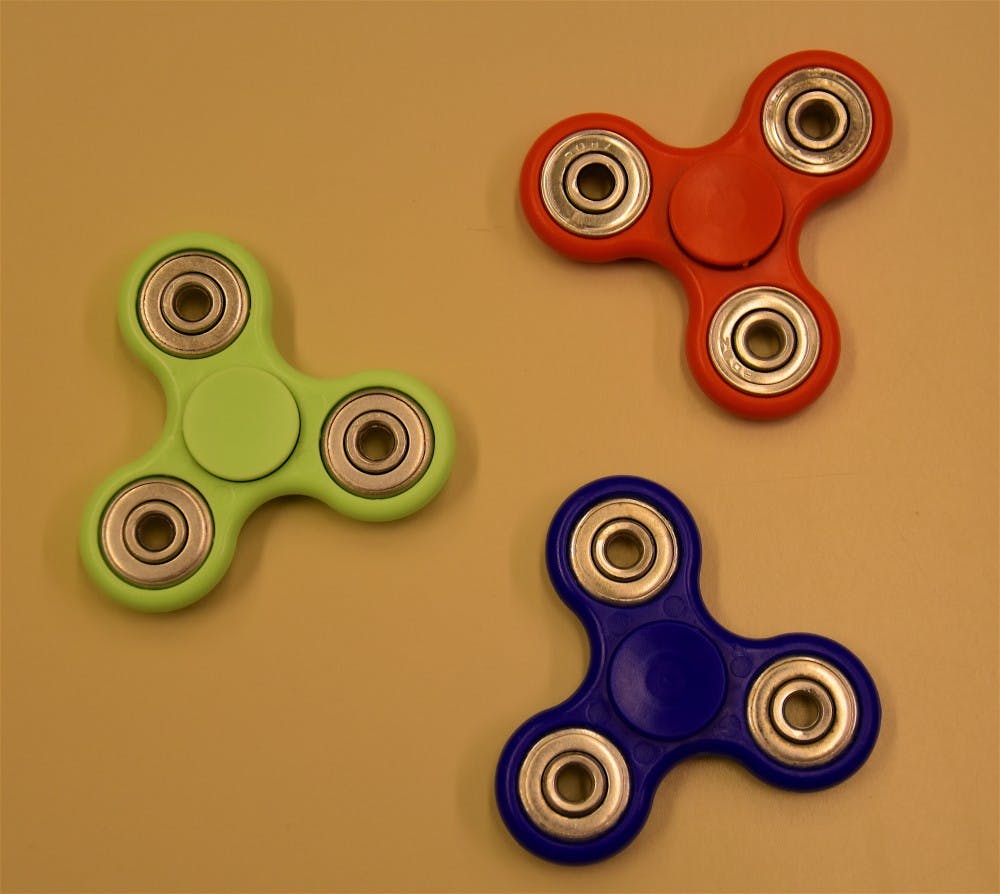The fidget spinner was originally invented in the early 1990’s and they weren’t seen as a toy, but today they are by many kids and adults.
Every year there is some sort of fad pulling itself into the mainstream just to die out as fast as it became popular. In recent history planking and Pokémon Go come to mind with 2017 bringing us the fidget spinner craze.
The fidget spinner was originally invented in the early 1990’s and they weren’t seen as a toy, but today they are by many kids and adults.
Jerrell Cassady, a professor of educational psychology at Ball State who studies test anxiety among students, said that fidget spinners fall into a category of devices called crutches.
"Fidget spinners were created primarily for helping students with Autism. It’s an occupational therapy technique, but ADHD was another area [where fidget spinners were used],” he said.
Cassady said the main idea around the devices was to give kids who suffered from Autism, ADHD and other diagnoses a way to improve their concentration and let out excess energy.
“Those spinners and those fidget cubes and all of those things have a long history in special education disciplines as a simple easy intervention to help kids," he said.
As far as relieving anxiety, Cassady said he wasn’t familiar with any specific work that links devices like the fidget spinner to a reduction in anxiety levels, but it isn’t surprising to him that some students see it as an effective strategy.
“If you can release the energy through some sort of outlet then it works,” he said. “If you believe the fidget spinner is helping you, it is helping you. We call it superstitious behaviors, they work."
Jonas James, a sophomore majoring in rhetoric and writing, has anxiety and having something to fidget with helps him.
“I use spinners, putty, cubes, and other items," James said. "For me they are necessary to get through classes. I don't like the trend because it means that the people who need them are overshadowed by those who don’t.”
James isn’t alone when it comes to this either.
Codey Fauber, a junior social work major, has ADHD and the fidget spinners help him “get rid of some of my energy in a mostly inaudible fashion.”
“Unfortunately many parents and other individuals treat them as toys for their kids or themselves and it has created a trend in banning these useful objects from the classroom,” he said.
Cassady has noticed how schools throughout the country have been leaning towards zero tolerance policies on fidget spinners and feels like it’s an unfortunate step for a useful tool for kids who need them.
Kayla Irvine, a senior social studies education major, has been substituting for various different age groups since her summer break has started.
“These fidget spinners are nice to help focus [and] not fidget, but all the other students see them as a toy," Irvine said. "I did not work one day without having an issue with fidget spinners,” she said.
At one point a student of hers who actually needed the fidget spinner had to put it away because it was distracting other students during a test.
“Most of the time as long as it wasn't a distraction or being used as a toy, it was okay [for her students to use],” Irvine said.
Cassady, the professor of educational psychology, said that the devices are generally good for kids who need them, but problems can come up when an individual becomes too reliant on it.
“I think they're likely to have a small impact for some folks and a moderate impact for others. They aren't a cure all in anyway, but generally they don't hurt," He said.
As for the newfound popularity of the spinners the professor believes that the soothing nature of them along with the cheap price have helped the device become popular.
He also feels like there is a bit of a status symbol to the devices too with all the colors and variations the devices can come in.
Overall, Cassady believes fidget spinners are no different than other homemade remedies that people have like spinning pins on a table.
"[They] just found a way to market it and sell it," He said.





